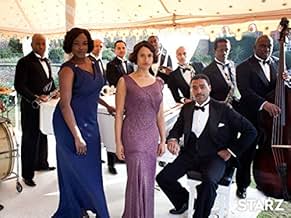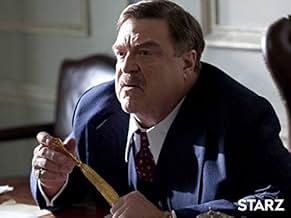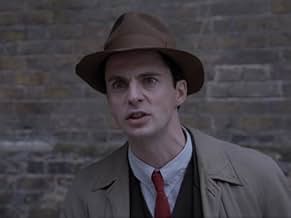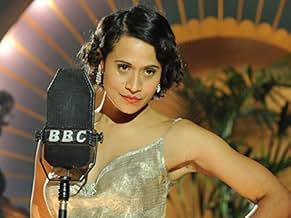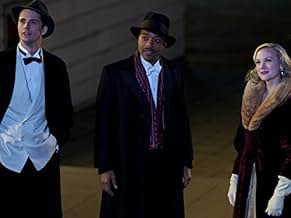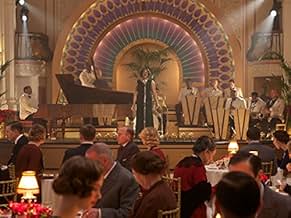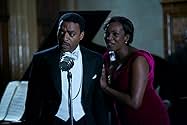VALUTAZIONE IMDb
7,4/10
2921
LA TUA VALUTAZIONE
Ambientata negli anni '30, una jazz band nera cresce in fama e popolarità mentre rimane invischiata in un'intricata rete di intrighi, mistero e suspense con l'élite della società londinese.Ambientata negli anni '30, una jazz band nera cresce in fama e popolarità mentre rimane invischiata in un'intricata rete di intrighi, mistero e suspense con l'élite della società londinese.Ambientata negli anni '30, una jazz band nera cresce in fama e popolarità mentre rimane invischiata in un'intricata rete di intrighi, mistero e suspense con l'élite della società londinese.
- Candidato a 1 Primetime Emmy
- 5 vittorie e 16 candidature totali
Sfoglia gli episodi
Recensioni in evidenza
For so many people not liking this, it has a high rating here on IMDb. I enjoyed it but see its flaws.
I am not familiar with the work of Stephen Poliakoff, so I can't comment on the criticisms of him.
The series is about a black jazz band in the 1930s who is discovered by a music journalist, Stanley Mitchell (Matthew Goode). With Wesley's help, the group is booked at the upscale Imperial Hotel and even entertain Prince George (erroneously described during the program as the Prince of Wales, who was actually Edward, Prince of Wales).
The band becomes successful and is written up often by Mitchell. With two talented singers (Wunmi Mosaku and Angel Coulby), they come to the attention of a record company and radio. But tragedy strikes, and the ensuing events threaten to ruin the band.
I'm at a disadvantage here because I'm not familiar with early '30s jazz music, but the critiques say the music presented is actually from a decade later. The songs are original to the production, which were also criticized. The producers certainly could have found actual songs, but I suppose they didn't want to pay for the rights. A couple of the songs weren't very good.
It's an expensive production with some excellent actors: Goode, who I've always loved, Chiwetel Ejiofor as Louis Lester, the leader of the band, Anthony Head, John Goodman, Tom Hughes, and Jacqueline Bisset. Very formidable.
There was also criticism that the series did not really evoke the '30s. I thought it looked wonderful, particularly the hotel scenes. But I agree, there was something missing in the period feel.
Fascinating to me was the statement in the series that the Brits didn't know what Americans sounded like until the advent of talking pictures, as well as the talk of the wireless. One really does get the feeling of limited communication and how far we've come.
Suspenseful, well-acted, this could have been more fascinating with some stronger writing, attention to period details, and maybe some cutting, perhaps to four episodes instead of six.
The research wasn't perfect -besides the Prince of Wales ID, there was also the reference to Clark Gable. In 1933, Clark Gable was just coming onto the radar in the U. S. Ronald Colman would have been much better. The devil is in the details.
I am not familiar with the work of Stephen Poliakoff, so I can't comment on the criticisms of him.
The series is about a black jazz band in the 1930s who is discovered by a music journalist, Stanley Mitchell (Matthew Goode). With Wesley's help, the group is booked at the upscale Imperial Hotel and even entertain Prince George (erroneously described during the program as the Prince of Wales, who was actually Edward, Prince of Wales).
The band becomes successful and is written up often by Mitchell. With two talented singers (Wunmi Mosaku and Angel Coulby), they come to the attention of a record company and radio. But tragedy strikes, and the ensuing events threaten to ruin the band.
I'm at a disadvantage here because I'm not familiar with early '30s jazz music, but the critiques say the music presented is actually from a decade later. The songs are original to the production, which were also criticized. The producers certainly could have found actual songs, but I suppose they didn't want to pay for the rights. A couple of the songs weren't very good.
It's an expensive production with some excellent actors: Goode, who I've always loved, Chiwetel Ejiofor as Louis Lester, the leader of the band, Anthony Head, John Goodman, Tom Hughes, and Jacqueline Bisset. Very formidable.
There was also criticism that the series did not really evoke the '30s. I thought it looked wonderful, particularly the hotel scenes. But I agree, there was something missing in the period feel.
Fascinating to me was the statement in the series that the Brits didn't know what Americans sounded like until the advent of talking pictures, as well as the talk of the wireless. One really does get the feeling of limited communication and how far we've come.
Suspenseful, well-acted, this could have been more fascinating with some stronger writing, attention to period details, and maybe some cutting, perhaps to four episodes instead of six.
The research wasn't perfect -besides the Prince of Wales ID, there was also the reference to Clark Gable. In 1933, Clark Gable was just coming onto the radar in the U. S. Ronald Colman would have been much better. The devil is in the details.
Firstly, at the time of writing (16 September 2013) the information for this on the main page is incorrect. It says this film/series is not yet released. However, I've just watched all 5 episodes on DVD (2 DVDs to be precise), plus the extra almost 1 hour "interview" between Stanley and Louis. The DVD release date was March 2013.
Like another reviewer I simply don't understand some of the poor ratings for this film. It was an immaculate production with an excellent cast for, I think, a cracking, well written story. It has style, suspense, humour, sensuality, good looks, great music and, as with so much of Stephen Poliakoff's work, a lot of intelligent dialogue and some fairly long scenes. But that's why I'm a fan of Poliakoff's work - it is literate, well researched and observed, and you have to pay attention. It rewards that attention many time over.
I must say there were some performances that were a revelation to me. Jacqueline Bisset for a start, and the late Mel Smith. But everyone was really outstanding in the parts they played. Joanna Vanderham is astonishingly mature well beyond her years (19 or 20 years old during the production) and is destined I feel to be a great actress. One cannot comment on this production without mentioning the singers - 2 established actresses who had never sung in public, in theatre, TV or on film before. They did their own singing and were amazingly good.
Like another reviewer I simply don't understand some of the poor ratings for this film. It was an immaculate production with an excellent cast for, I think, a cracking, well written story. It has style, suspense, humour, sensuality, good looks, great music and, as with so much of Stephen Poliakoff's work, a lot of intelligent dialogue and some fairly long scenes. But that's why I'm a fan of Poliakoff's work - it is literate, well researched and observed, and you have to pay attention. It rewards that attention many time over.
I must say there were some performances that were a revelation to me. Jacqueline Bisset for a start, and the late Mel Smith. But everyone was really outstanding in the parts they played. Joanna Vanderham is astonishingly mature well beyond her years (19 or 20 years old during the production) and is destined I feel to be a great actress. One cannot comment on this production without mentioning the singers - 2 established actresses who had never sung in public, in theatre, TV or on film before. They did their own singing and were amazingly good.
This television series from the celebrated Stephen Poliakoff portrays 1930s upper class London but focuses on a Black Jazz band travelling the clubs of Britain.
They mix with the high ups of polite British society but reveals an underbelly of prejudice, secrets and murder.
Chiwetel Ejiofor plays Louis Lester, trained in the USA but his jazz band takes London by storm when armed with two female singers.
Matthew Goode plays a music journalist who champions the band in his music paper. John Goodman turns up as a mogul who wants to buy newspapers.
Although there are twists and turns, Poliakoff needs to stick to writing. He needs a stronger story editor and get someone else to direct and interpret his words to the screen.
It looks good, there is a fine all star cast from Jacqueline Bisset, Jane Asher, Anthony Head. The music and songs which was written specially for the series is fine with a few memorable tunes but it meanders too much.
The murder story has little mystery as you have a rough idea who the culprit might be.
They mix with the high ups of polite British society but reveals an underbelly of prejudice, secrets and murder.
Chiwetel Ejiofor plays Louis Lester, trained in the USA but his jazz band takes London by storm when armed with two female singers.
Matthew Goode plays a music journalist who champions the band in his music paper. John Goodman turns up as a mogul who wants to buy newspapers.
Although there are twists and turns, Poliakoff needs to stick to writing. He needs a stronger story editor and get someone else to direct and interpret his words to the screen.
It looks good, there is a fine all star cast from Jacqueline Bisset, Jane Asher, Anthony Head. The music and songs which was written specially for the series is fine with a few memorable tunes but it meanders too much.
The murder story has little mystery as you have a rough idea who the culprit might be.
A clever story with enough intrigue to keep it exciting. The characters are all very interesting and their chemistry works well together.
Stanley writes and edits a local music rag and hears Louis Lester's band in a local dive. He decides to help them become successful and succeeds.
I wouldn't read the blurbs here accompanying each episode because they describe exactly what happens in that particular episode.
The production values, camera work, sets, costumes, make-up and hair are all great and authentic. There is just the right balance between the drama and the music.
They don't get too bogged down with the politics of "negro" prejudice which is refreshing. Yet we are always aware of it in the background.
My only disappointment was I felt the ending of Episode 5 was extremely rushed with a lack of the usual explanation and depth.
I assumed it was the final episode until I saw Episode 6 listed in the TV guide for tonight.
The Interview was something Stanley always wanted but I found the episode boring and superfluous especially since it wasn't the interview I was expecting. We didn't need this companion piece. They would have been better spending more time on the the end of the series although I think Stanley left us with a wimpy cliffhanger for a potential Season 2.
It's almost as if they ran out of funding, time or backing and several of the main stars left before the end of Episode 5. Episode 6 was improvised and didn't make any sense because Stanley obviously had been gathering interview material from the start.
Stanley writes and edits a local music rag and hears Louis Lester's band in a local dive. He decides to help them become successful and succeeds.
I wouldn't read the blurbs here accompanying each episode because they describe exactly what happens in that particular episode.
The production values, camera work, sets, costumes, make-up and hair are all great and authentic. There is just the right balance between the drama and the music.
They don't get too bogged down with the politics of "negro" prejudice which is refreshing. Yet we are always aware of it in the background.
My only disappointment was I felt the ending of Episode 5 was extremely rushed with a lack of the usual explanation and depth.
I assumed it was the final episode until I saw Episode 6 listed in the TV guide for tonight.
The Interview was something Stanley always wanted but I found the episode boring and superfluous especially since it wasn't the interview I was expecting. We didn't need this companion piece. They would have been better spending more time on the the end of the series although I think Stanley left us with a wimpy cliffhanger for a potential Season 2.
It's almost as if they ran out of funding, time or backing and several of the main stars left before the end of Episode 5. Episode 6 was improvised and didn't make any sense because Stanley obviously had been gathering interview material from the start.
Good points: Matthew Goode was excellent in his role as Stanley. His character was original and he carried the show, in my opinion. Most of the others were all right and did what they could with the material. The story kept me watching and interested to the end.
Bad points: It took place in a depopulated London (reminding me of 'Survivors' or 'Day of the Triffids') and never convinced me for a second that it was 1933. The tame music seemed very unlikely to offend anybody at that date, when much 'hotter' jazz had been available for at least a decade previously. Some of it sounded more like the swing music of the forties. Tom Hughes' character and acting was ho-hum. The hiding from the police became silly and unbelievable in the last episode.
Like others, I cannot understand why the BBC think this director is something special and throw money in his direction. But it's worth seeing.
Bad points: It took place in a depopulated London (reminding me of 'Survivors' or 'Day of the Triffids') and never convinced me for a second that it was 1933. The tame music seemed very unlikely to offend anybody at that date, when much 'hotter' jazz had been available for at least a decade previously. Some of it sounded more like the swing music of the forties. Tom Hughes' character and acting was ho-hum. The hiding from the police became silly and unbelievable in the last episode.
Like others, I cannot understand why the BBC think this director is something special and throw money in his direction. But it's worth seeing.
Lo sapevi?
- QuizJenna Coleman and Tom Hughes would go on to star together as Queen Victoria and Prince Albert in the ITV period drama Victoria (2016).
- BlooperThe musical style of Louis Lester's band, and especially the vocal styles of his singers and the sorts of songs they perform, are typical of the 1950's, not the 1930's.
- ConnessioniFeatured in The Wright Stuff: Episodio #18.20 (2013)
I più visti
Accedi per valutare e creare un elenco di titoli salvati per ottenere consigli personalizzati
- How many seasons does Dancing on the Edge have?Powered by Alexa
Dettagli
- Data di uscita
- Paese di origine
- Lingua
- Celebre anche come
- 邊緣之舞
- Luoghi delle riprese
- Severn Valley Railway, Shropshire, Inghilterra, Regno Unito(Folkestone and South Bromley stations)
- Aziende produttrici
- Vedi altri crediti dell’azienda su IMDbPro
Contribuisci a questa pagina
Suggerisci una modifica o aggiungi i contenuti mancanti

Divario superiore
By what name was Dancing on the Edge (2013) officially released in India in English?
Rispondi



